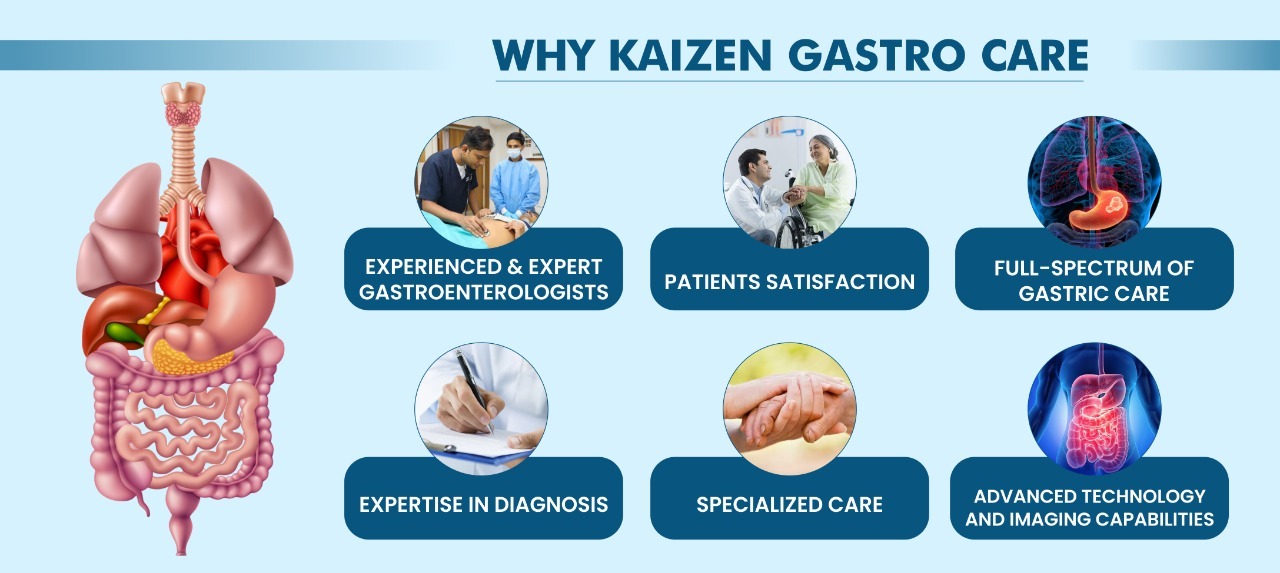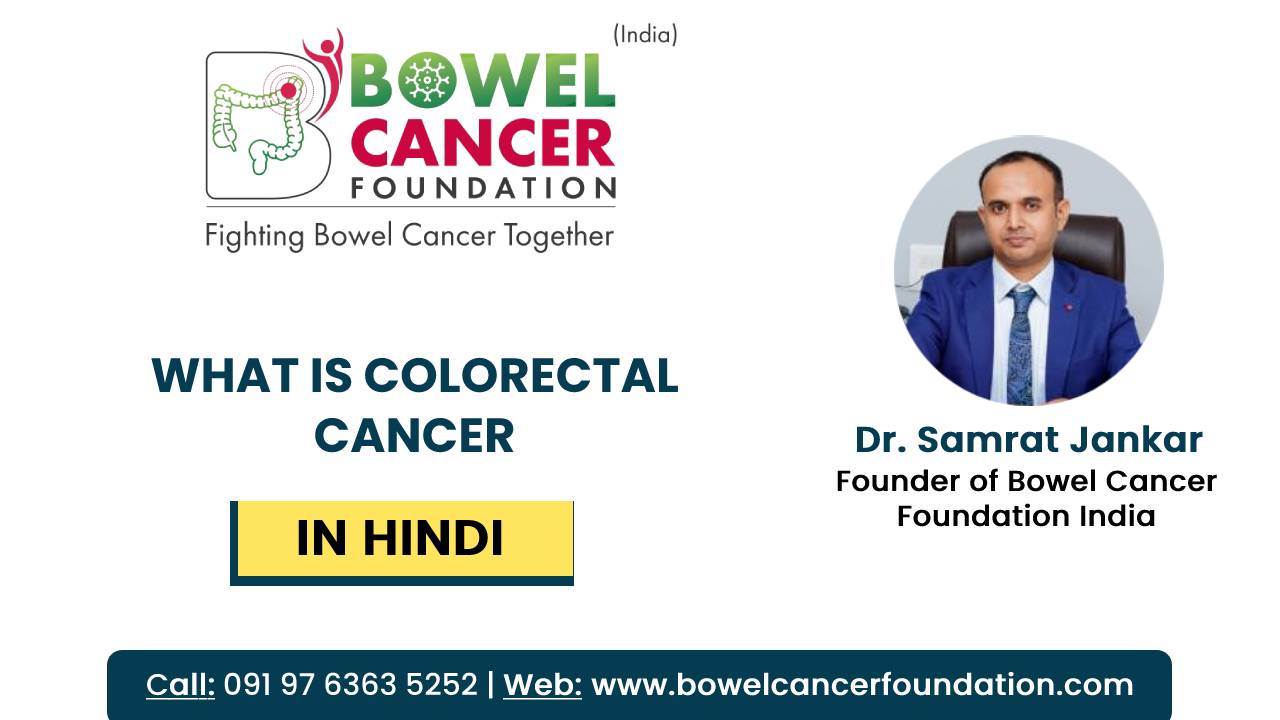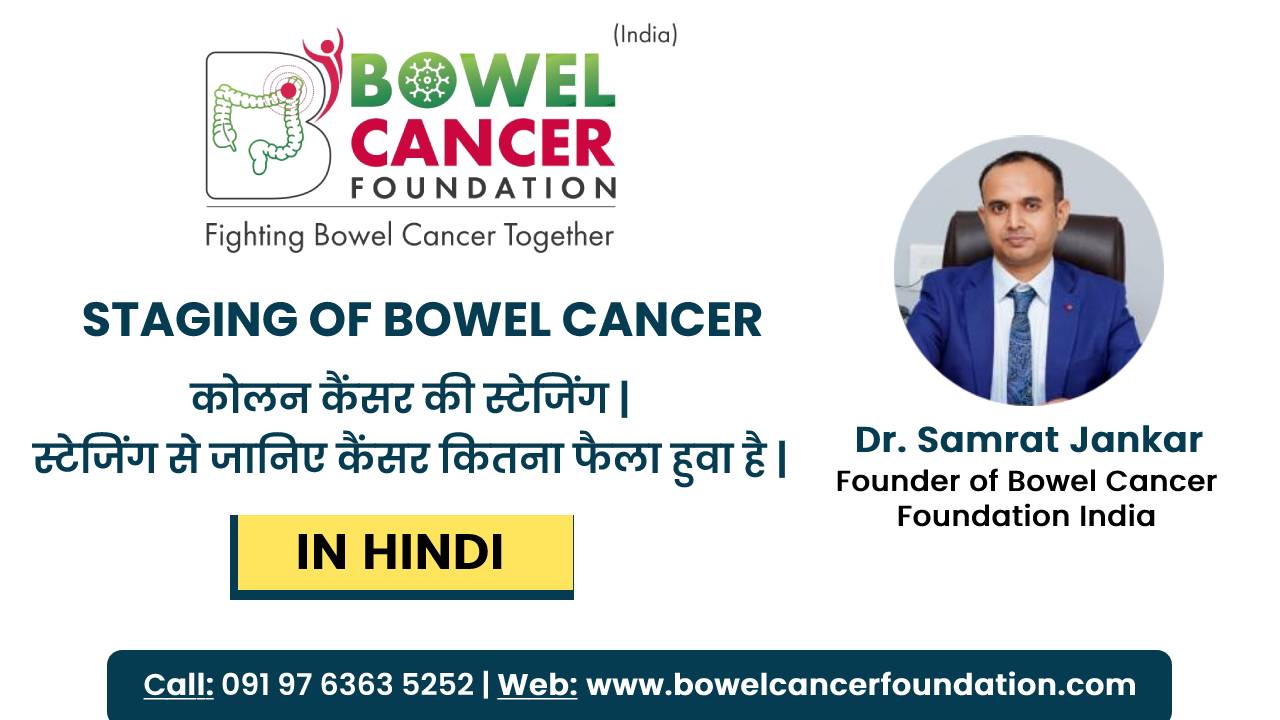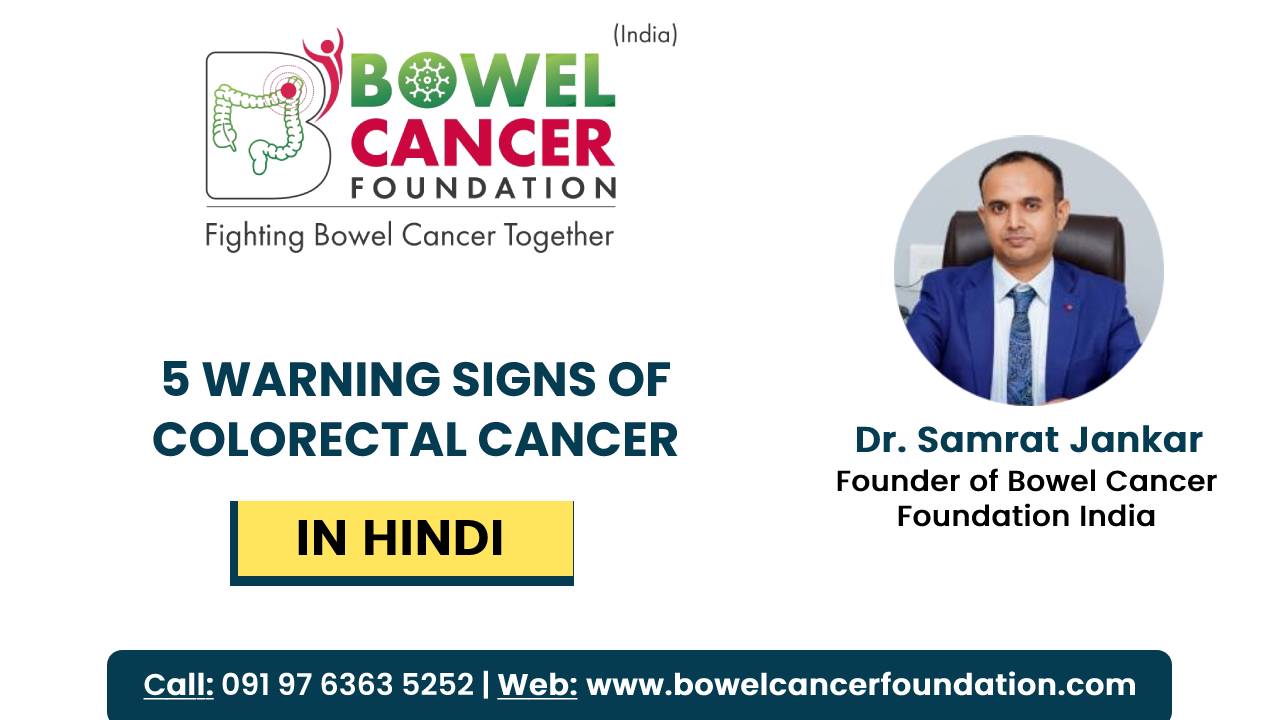Colorectal Cancer Treatment in Pune- Kaizen Gastro Care
Kaizen Gastro Care” is the one-stop solution for all types of Colorectal Cancer treatments. Our Specialists Dr. Vikrant Kale & Dr. Samrat Jankar are one of the best Colorectal Cancer specialist in Pune. who treats various Colorectal Diseases at Kaizen Gastro Care.
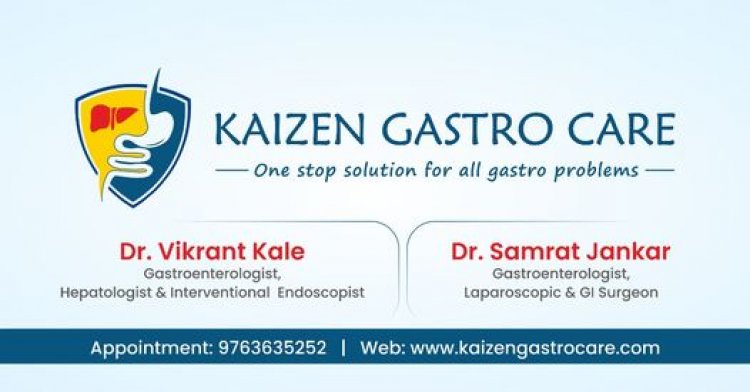
Cancer that begins in the colon is called colon cancer, while cancer in the rectum is known as rectal cancer. Cancers that affect either of these organs may be called colorectal cancer. Though not true in all cases, the majority of colorectal cancers generally develop over time from adenomatous (precancerous) polyps. Polyps (growths) can change after a series of mutations (abnormalities) arise in their cellular DNA.
Kaizen Gastro Care” is the one-stop solution for all types of Colorectal Cancer treatments. Our Specialists Dr. Vikrant Kale & Dr. Samrat Jankar are one of the best Colorectal Cancer specialist in Pune. who treats various Colorectal Diseases at Kaizen Gastro Care.
Some of the risk factors for colorectal cancer involve a family history of colon or rectal cancer, diet, alcohol intake, smoking and inflammatory bowel disease.
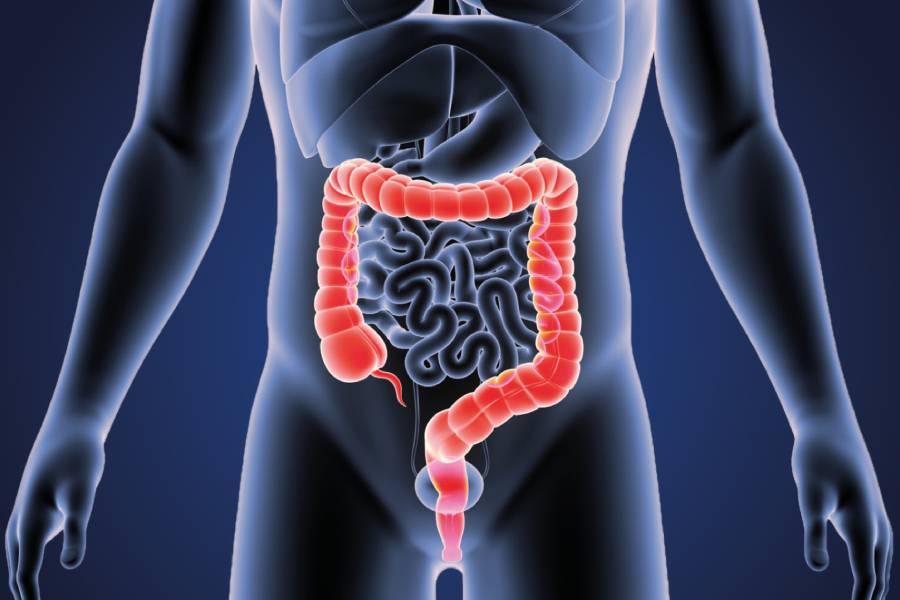
What are the signs and symptoms of colorectal cancer?
Unfortunately, some colorectal cancers might be present without any signs or symptoms. For this reason, it is very important to have regular colorectal screenings (examinations) to detect problems early. The best screening evaluation is a colonoscopy. Other screening options include fecal occult blood tests, fecal DNA tests, flexible sigmoidoscopy, barium enema, and CT colonography (virtual colonoscopy). The age at which such screening tests begin depends upon your risk factors, especially a family history of colon and rectal cancers.
Even if you do not have a family history of colorectal cancer or polyps, tell your doctor if you have any of the signs that could indicate colorectal cancer, no matter what your age. Common signs of colorectal cancer include the following:
- Change in bowel habits: Constipation, diarrhea, narrowing of stools, incomplete evacuation, and bowel incontinence— although usually symptoms of other, less serious problems — can also be symptoms of colorectal cancer.
- Blood on or in the stool: By far the most noticeable of all the signs, blood on or in the stool can be associated with colorectal cancer. However, it does not necessarily indicate cancer, since numerous other problems can cause bleeding in the digestive tract, including hemorrhoids, anal tears (fissures), ulcerative colitis, and Crohn’s disease, to name only a few. In addition, iron and some foods, such as beets, can give the stool a black or red appearance, falsely indicating blood in the stool. However, if you notice blood in or on your stool, see your doctor to rule out a serious condition and to ensure that proper treatment is received.
- Unexplained anemia: Anemia is a shortage of red blood cells— the cells that carry oxygen throughout the body. If you are anemic, you may experience shortness of breath. You may also feel tired and sluggish, so much so that rest does not make you feel better.
- Abdominal or pelvic pain or bloating
- Weight loss
- Vomiting
Screening for colorectal cancer At Kaizen Gastro Care:
Several tests are used to screen for colorectal cancer. Although colonoscopy is most recommended, other options are available. These are the most common screening tests:
- Fecal immunochemical test (FIT): This test looks for blood in the stool that is not easily seen visually. This test can be done at home by collecting stool in tubes. The collected stool will be tested at a lab for any blood.
- Guaiac-based fecal occult blood test (gFOBT): Similar to the FIT test, the guaiac-based fecal occult blood test also looks for hidden blood in the stool. The specimen (stool) for this test is also collected at home and sent to a lab. In this test, a chemical reaction is used to screen for any hidden blood. However, the gFOBT is unable to determine where in the digestive tract the blood is coming from. Additional testing will be needed to determine the exact location of the blood.
- Fecal DNA test: The fecal DNA test works by detecting genetic mutations and blood products in the stool. Genetic material, called DNA, is present in every cell of the body, including the cells lining the colon. Normal colon cells and their genetic material are passed with the stool every day. When a colorectal cancer or a large polyp develops, abnormalities (or mutations) occur in the genetic material of the cells. Some mutations present in the polyp or cancer can be detected by laboratory analysis of the stool.
- Flexible sigmoidoscopy: A flexible sigmoidoscopy uses a device called a sigmoidoscope to see inside the rectum and lower colon. Unlike the tool used during a colonoscopy, this device is not as long, limiting how much of the colon can be seen. During this procedure, the sigmoidoscope is inserted into the anus and up through the rectum and sigmoid colon (s-shaped part). Gas is pumped in during the procedure to allow the caregiver the best possible view. This is a brief outpatient procedure, often performed without sedation. The bowel must be empty for this procedure—typically done with the help of a laxative and or enema before the test. Small polyps found during the procedure can be removed and tested for cancer. If these tests come back positive, a colonoscopy will be done.
- Colonoscopy: Colonoscopy is the best procedure to check for colorectal polyps and cancer. Colonoscopy is an outpatient procedure in which a physician uses a long, flexible scope (called a colonoscope) to view the rectum and entire colon. During the procedure, polyps can be removed and tested for signs of cancer. The bowel must be cleaned-out—done with the help of a laxative (“bowel preparation”)—before the procedure begins. The patient is usually given a sedative for this procedure and will need help getting home afterward as the sedative wears off. A colonoscopy is considered a safe procedure with few risks.
- Double contrast barium enema: This is an X-ray examination of the colon and rectum in which barium is given as an enema (through the rectum). Air is then blown into the rectum to expand the colon, producing an outline of the colon on an X-ray. Barium enema is not the most accurate method and should not be the procedure of choice for colorectal cancer screening. It also requires a bowel preparation.
- CT colonography (virtual colonoscopy): In this procedure, also known as CT colonoscopy or virtual colonoscopy, a CT scan (imaging created with the use of X-rays) of the abdomen and pelvis is performed after drinking a contrast dye and inflating contrast and air into the rectum. No sedation is needed for this test. Like colonoscopy and barium enema, the colon must be cleaned out before the examination. In the case that a polyp is found, then a colonoscopy must be performed.
Diagnosis of Colorectal Cancer at Kaizen Gastro :
- Blood tests (Complete blood count, tumor markers and liver enzymes)
- Imaging tests (X-rays, CT scan, MRI scan, PET scan, ultrasound, angiography)
- Biopsy
- Diagnostic colonoscopy (done after you show symptoms, not as a routine screening test)
- Proctoscopy
Risk for colorectal cancer?
Every one of us is at risk for colorectal cancer. Although the exact cause for the development of precancerous colon polyps that lead to colorectal cancer is not known, there are some factors that increase a person’s risk of developing colorectal polyps and cancer. These risk factors include:
- Age: The risk of developing colorectal polyps and cancer increases with age. Colorectal cancer is more common in people over the age of 50, however, younger adults can also develop colorectal cancer.
- Other medical conditions: Medical conditions (type 2 diabetes, previous history of cancer, history of inflammatory bowel disease) and inherited conditions (Lynch syndrome, familial adenomatous polyposis) can increase your chances of developing colorectal cancer.
- Lifestyle factors: You may be at increased risk for developing colorectal cancer if you drink alcohol, use tobacco, don’t get enough exercise, and/or if you are overweight. Smoking increases the risk of precancerous polyps and colorectal cancer. A diet high in fat and calories and low in fiber, fruits and vegetables has been linked to a greater risk of developing colorectal cancer. Many lifestyle factors that increase the risk of colorectal cancer can be modified to lessen that risk.
